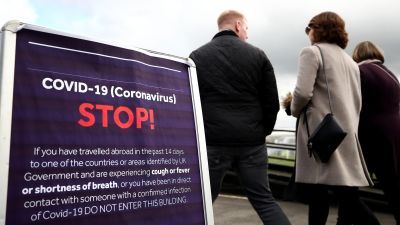Payments for low-paid self-isolating in areas with high rates of Covid-19

People on low incomes who need to self-isolate in areas where there are high numbers of coronavirus cases will be able to claim a maximum of £182 from the Government.
The Health Secretary Matt Hancock has confirmed that as of Tuesday September 1, people on either Universal Credit or Working Tax Credit, who are required to self-isolate and are unable to work from home, in areas with high incidences of Covid-19, will benefit from a new payment scheme.
Starting with a trial in Blackburn with Darwen, Pendle and Oldham, eligible people who test positive for the virus will receive £130 for their 10-day period of self-isolation.
Other members of their household, who under the current rules have to self-isolate for 14 days, will be entitled to a payment of £182.
The Department for Health and Social Care added that non-household contacts who are advised to self-isolate through the NHS Test and Trace system will also be entitled to a payment of £13 per day up to a maximum of £182, dependent on the length of their isolation period.
The payment will not reduce any other benefits that a person may already receive, the department said.
Payments will be provided within 48 hours of the eligible person providing all the necessary evidence, and to receive the payment people will be asked to provide a notification from NHS Test and Trace and a bank statement.
Am I eligible?
To be eligible, an individual must:
Have tested positive for Covid-19
Received a notification from NHS Test and Trace asking them to self-isolate.
Have agreed to comply with the self-isolation guidance and provided contact details to the relevant local authority,.
Be employed or self-employed, be unable to work from home and be losing income as a result and be currently receiving Universal Credit or Working Tax Credit.
Employed people will be asked to show proof of employment, while self-employed people will be required to show evidence of trading income and that their business delivers services which the local authority reasonably judges they are unable to carry out without social contact.
The department added that checks will be undertaken on all applicants to ensure they are self-isolating. Local authorities will be able to check the NHS Test and Trace system to confirm an individual has been asked to self-isolate, if an individual is unable to provide this information, and will put in place checks to prevent fraud, the department said.
It added that there will be a rapid review of the pilot scheme in Blackburn to assess how effectively vulnerable people have been reached and transmission has been reduced.
If the approach is successful, the scheme will be quickly applied in other areas where coronavirus cases are prevalent, DHSC said.
But Labour's shadow chancellor Anneliese Dodds said "everyone should get the support they need to self-isolate".
Ms Dodds said: "Effective local lockdowns depend on people self-isolating when they're supposed to. Labour has been warning for months that the Government needs to make sure that people can afford to do the right thing, but once again ministers have taken far too long to realise there's a problem."
The Mayor of Greater Manchester, Andy Burnham, added: "I have been calling for weeks for the Government to provide financial support for those asked to self-isolate. I am pleased they have at last acknowledged this issue but am sorry to say this move goes nowhere near far enough.
"The Health Secretary has already said that he couldn't live on Statutory Sick Pay (SSP) at £95 a week. So how can an announcement like this work?
Read more: